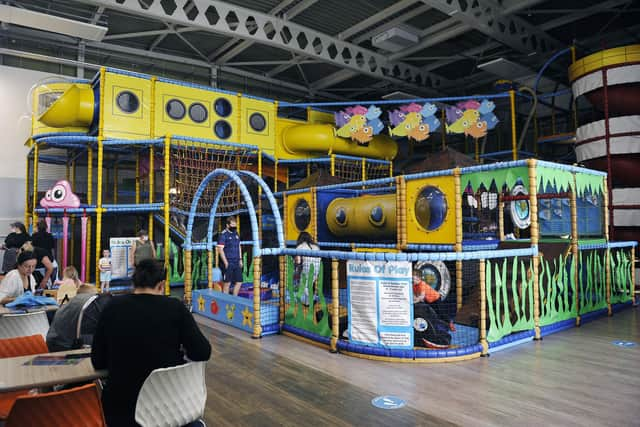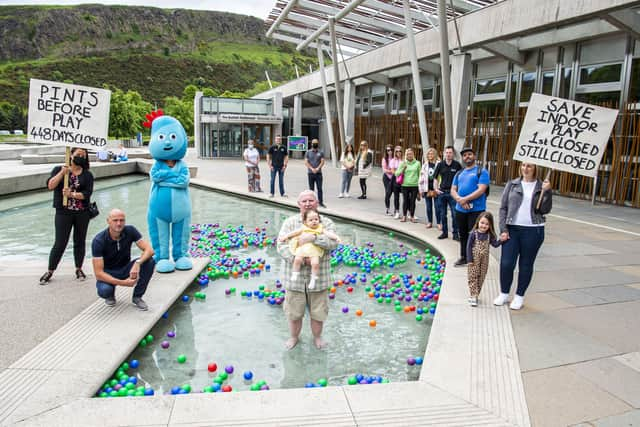'It's so painful to have to now start from scratch': how coronavirus has been taking the fun out of Scotland's soft play sector
What’s more – and perhaps just as crucially – such venues are enabling adults to enjoy a little peace and quiet as their charges let off steam.
But while soft play bosses welcome the permission granted on July 13 to reopen their doors where previously that wasn’t the case, they find themselves still dealing with the consequences of having endured as many twists, turns and obstacles as their own facilities – only not quite as fun.
Advertisement
Hide AdAdvertisement
Hide AdMartin Hannah is the owner and operator of The Bubbles Factory in Carluke – and he was among members of the soft play industry to have taken part in protests outside the Scottish Parliament about the way the sector has been treated.


The number of such centres north of the Border has fallen from just shy of 150 in September to about 85 now, as financial pressures took their toll, he says. “You're talking about all these family businesses being lost and being destroyed,” he adds – stressing that they’ve not succumbed as a direct result of the virus, but rather the way the sector has been handled.
“Initially, we were grouped with nightclubs and adult entertainment, which defies logic to me,” he adds, saying soft play centres have subsequently fallen between the stools of support for related sectors. Government support for his industry “just never touched the sides at all”.
Adding to the frustration is the fact that peers in England have been able to reopen sooner. “There was no epidemic caused by soft play opening in England, ” says Mr Hannah. “Why the Scottish Government seemed to think that Scottish kids are some sort of plague-ridden magnet, I do not know.”


The Association of Indoor Play (AIP) in June said it stood “united with its Scottish members and all Scottish indoor play operators in calling out what has been an extremely unfair and unjustified 14-month period of closure based on no evidence… AIP calls on the Scottish government to end this madness now and let children enjoy their equivalent of a gym.”
The organisation, which was formed in August 2020, also said in June of this year that the majority of centres across the UK who responded to a survey were running at a loss greater than 30 per cent, and mostly greater than 40 per cent. That comes after the AIP said in October that out of about 1,100 play centres in the UK and Northern Ireland, around 100 had folded since the country locked down in March.
The Bubbles Factory is a purpose-built centre that opened in 2010 after investment of more than £1 million, more than half of which came from the Scottish Government’s £60 million Town Centre Regeneration Fund.
In the interim it has picked up accolades such as the Play Providers Association award for the UK’s best new indoor soft play area and cafe – and it had 14 staff before the pandemic. However, this has now been reduced significantly. “We’re keeping it very low key, because we can't afford to make one mistake in terms of the costings and the costs going forward,” says Mr Hannah.
Advertisement
Hide AdAdvertisement
Hide AdHe also notes that trampoline parks have been able to reopen sooner, a point also stressed by fellow soft play business owner Sarah Davidson, who also protested at the Scottish Parliament.
She says she has found the way the sector has been treated “incredibly frustrating”, while other industries with comparable risk factors have been allowed to reopen much sooner. “It just feels that we've been sort of singled out. The decision-making is bizarre.”
Ms Davidson is not opening her Whale of A Time centre in Glasgow’s Shawlands until August 5. “Getting the go-ahead [on Tuesday July 13] at two o'clock does not give you a lot of time when your business has been in hibernation for 16 months. I'd also lost my whole team, so it's starting with them again, getting everybody retrained and getting everything up and running.”
She also feels as if her progress has been undone, having pre-pandemic had a business with no debt, but one that nobody would want to buy just now. “It's just so painful to have to now start from scratch... I sold my house to buy my business.
"I've now got tens of thousands of pounds worth of debt, which if I hadn't taken on, I would have gone bust. But I had no choice to do that, because I was given practically no sustainable funding that would keep me going for 16 months.”
Neither Mr Hannah nor Ms Davidson want to downplay the health risks of Covid, but rather take a realistic and pragmatic approach. While children are obviously mixing with relatives in higher-risk age groups, a recently published study found that the overall mortality rate of Covid in children is two per million.
Ms Davidson says: “I fully appreciate that my business should have been closed when it wasn't safe to open. But I question the length of time that I've been closed for.”
She also believes the Scottish Government “should have recognised the importance of children's play and put children and those kind of decisions at the heart of their decision-making”.
Advertisement
Hide AdAdvertisement
Hide AdBoth agree that the recovery will be a slow process, particularly as centres have reopened at what is not exactly peak season for the sector – the summer, and during a particularly warm spell this summer when children are inevitably heading outdoors.
Looking ahead, Mr Hannah says that “coming out of the pandemic the job of social interaction and exercise, and bringing families together in a fun environment would be the thing that you'd be pushing forward and building on”.
He cites the “fear” in the eyes of children about returning to mix with larger groups, while from a staff perspective there has been the toll on mental health of venues being closed for so long – and then having to fire on all cylinders to prepare in a short space of time to reopen. “That crushes you as well. You really do lose sleep over what's happening, and what the future holds.”
In terms of getting further government support for the sector, he says the authorities should look at what they can now do rather than at the past. “You don't drive a car looking in the rearview mirror."
A message from the Editor:
Thank you for reading this article. We're more reliant on your support than ever as the shift in consumer habits brought about by coronavirus impacts our advertisers.
If you haven't already, please consider supporting our trusted, fact-checked journalism by taking out a digital subscription.
Comments
Want to join the conversation? Please or to comment on this article.
